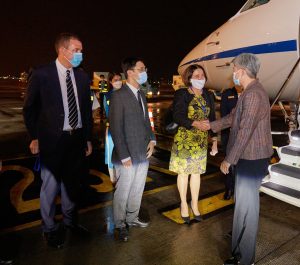Australian Foreign Minister Penny Wong yesterday departed on a trip to Vietnam and Malaysia, her second to Southeast Asia in just over a month. According to a statement issued by Wong’s office yesterday, the tour is aimed “at building on our existing partnerships for the benefit of our countries and the region.”
“Australia’s future is tied to the future of Southeast Asia, a region we share,” Wong said in the statement. “It’s more than geography that binds us – we have genuine links in Vietnam and Malaysia: family, business, education and tourism.”
In Vietnam, where Wong arrived yesterday evening, she is scheduled to meet with President Nguyen Xuan Phuc, Prime Minister Pham Minh Chinh, and Foreign Minister Bui Thanh Son, for discussions that will “focus on climate change cooperation, our shared trade and investment ambitions and Australia’s continued support for Vietnam’s COVID-19 recovery.”
In Malaysia, where she arrives tomorrow, Wong will visit Foreign Minister Saifuddin Abdullah, Defense Minister Hishammuddin Hussein, and Trade and Industry Minister Azmin Ali. In discussions, she pledged to “reaffirm our commitment as Comprehensive Strategic Partners and discuss economic recovery, climate action, education ties and health security.”
Wong will then finish her trip with a visit to Sabah, where she traces her lineage. “Having spent my early years in Kota Kinabalu, I look forward to the great honor of returning to the city as Australia’s Foreign Minister,” the statement said. Malaysia’s The Star newspaper reported that Wong’s relatives were “looking forward to a small gathering as she makes a quick overnight stop in the city,” with her younger half-brother James saying that she wished to visit the resting place of their paternal grandmother Lai Fung Shim, and sample the toothsome local fare.
Coming after Wong accompanied Prime Minister Anthony Albanese to Indonesia, a trip that was widely praised for setting an important bilateral relationship off on a friendly and positive footing, with Albanese declaring that the relationship was “more than symbolic,” Wong’s current trip will certainly succeed in maintaining the momentum in the new government’s commitment to Southeast Asia.
Before the May 21 election, the Albanese campaign pledged a renewed attention to Southeast Asia. It promised that it would bolster the country’s aid budget to the region, focus on thickening economic and trade ties, and appoint a new senior envoy for regional affairs in order to “cut through bureaucratic blockages” and bind these various threads together. Albanese has also promised to attend Indonesia’s G20 summit in Bali in November, despite the controversy over the possible attendance of Russian President Vladimir Putin.
Wong herself is also a good ambassador for this message given her family connections to the region, which excited much commentary in Malaysia upon her elevation to the foreign ministry last month. (It also vicariously showcased the sorry brain-drain of Chinese-Malaysians due to the country’s system of institutionalized ethnic preferences for Malays.)
The consensus among Australian observers of Southeast Asia is that the Albanese government has so far said everything right about forging closer relations with the nations of Southeast Asia, particularly its most populous, Indonesia.
But a cloud of questions hovers over the question of matching words with actions, and doing so in a sustained manner. After all, Southeast Asia has heard this sort of rhetoric from Australian leaders before, only to slip down Canberra’s order of priorities as the initial burst of energy fades.
As Tim Lindsay and Tim Mann noted recently in The Conversation, “The government-to-government relationship between Australia and Indonesia is a fragile one, easily broken when tensions arise.”
In recent years, Australia has invested much of its diplomatic energy in relationships with more geographically far-flung but strategically proximate countries, including its Quad partners – the United States, Japan, and India – and the United Kingdom, with which it last year formed the AUKUS security partnership along with the United States.
These partnerships have advanced and deepened because they have been forged on the basis of “like-minded” commitments, both strategic and ideological, as well as, in the case of Europe and North America, a broad cultural affinity. However, Southeast Asia is a region that tends to view anti-China groupings and alliances, even implicit ones, with a good deal of skepticism, if for no other reason than simple economic pragmatism. The region’s leaders, helming developing post-colonial states, also tend to view Western universalism with skepticism, even if Australia’s Department of Foreign Affairs has generally employed a lighter touch in this regard than some of its Western counterparts.
The biggest risk is that the Southeast Asia commitment will sparkle for a time and then fade. Lindsay and Mann argue that the government needs to think beyond the end of Albanese’s term as prime minister to embrace longer-term measures, such as efforts to reverse the precipitous decline in Asian language education and to support closer Australian business engagement with the region. This then needs to be backed by a serious budget commitment, without which “we can expect things to revert to the usual stalemate soon enough – at least until the next new prime minister gets on the plane to Jakarta again.”
More than symbolic? The next three years will tell.

































